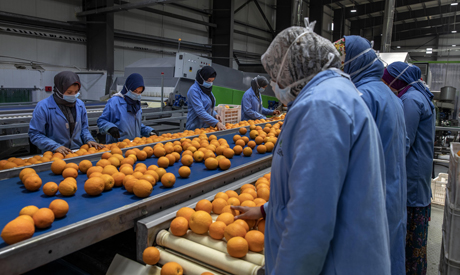Demand for Egyptian fruit and vegetables has been on the rise recently, despite the disruptive effects of the Covid-19 pandemic on global markets.
According to the Central Administration for Agricultural Quarantine (CAAQ), an agency of the Ministry of Agriculture, exports of Egyptian fruit and vegetables has reached 2.77 million tons since the beginning of 2020, and the number is expected to hit 5.5 million tons by the end of the year.
Total exports of fruit and vegetables in 2019 were 5.4 million tons.
Ahmed Al-Attar, head of the CAAQ, said in a press statement earlier this week that the exports mainly included citrus fruit, potatoes, and onions. He added that Egypt is the current leader in the worldwide exports of citrus fruit, mainly oranges, with annual exports of 1.8 million tons and accounting for nearly 40 per cent of the global exports of oranges.
He explained that since January Egypt had exported 1.2 million tons of citrus fruit, 550,000 tons of potatoes, and about 400,000 tons of onions. “Egypt has been able to impose itself strongly in the field of exporting oranges globally despite intense competition from Spain,” Al-Attar said.
He also announced that Egypt had managed to open up four new markets for the first time despite the coronavirus crisis, namely Australia for the export of dates, New Zealand for oranges, Brazil for various citrus fruit, and Mauritius for potatoes.
“This was done despite the difficulty of opening up new markets and the length of the negotiations that can come with such a process,” he said. “Egypt is now even exporting oranges to Spain, the second largest exporter of citrus fruit,” he added.
He said that Egyptian citrus fruit had a solid global reputation, especially oranges. The country had careful control systems for agricultural quarantine according to the specifications of each country.
Spokesperson for the Ministry of Agriculture and Land Reclamation Mohamed Al-Kersh said that every effort had been made to apply quality standards to the products, notably through a coding system tracking every product until it reached the consumer. He said 5,000 people had been trained to apply the new system.
He added that the ministry had increased the number of citrus-fruit trees in Egypt by 5.1 per cent in 2019, contributing to increasing production by about 10 per cent. This had helped Egypt to export to more than 140 countries, including those in the European Union, Russia, Saudi Arabia, Argentina and Serbia, he added.
Mohsen Al-Beltagi, head of the Horticultural Export Improvement Association, attributed the increase in agricultural exports to the fact that many countries, especially in the European Union, were suffering from shortages of agricultural products due to lockdowns introduced to halt the spread of the coronavirus and these had provided opportunities for the Egyptian market.
He expected exports of vegetables and fruit to increase by five to 10 per cent by the end of the year, driven by increased demand from Arab and European countries.
Egypt has about 12.3 million orange trees with a production capacity of 3.45 million tons. Revenues from exporting the fruit totaled $662 million in 2019, Al-Beltagi stated, adding that Egypt had increased its number of orange trees by 44 per cent over the past 10 years.
Russia tops the list of countries importing oranges grown in Egypt, with Russian imports of Egyptian oranges reaching 284,000 tons, followed by Saudi Arabia at 271,000 tons, China at 214,000 tons, and the Netherlands at 130,000 tons.
The Industry Committee of parliament called on Sunday for the development of an integrated strategy to take advantage of the global recession that has emerged as a result of the coronavirus pandemic and the need of many countries to find ways of meeting their consumption needs, especially of agricultural products.
Ahram Online
14/05/2020

























































